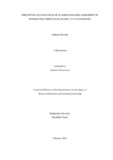
Please use this identifier to cite or link to this item:
https://hdl.handle.net/20.500.14301/509Full metadata record
| DC Field | Value | Language |
|---|---|---|
| dc.contributor.author | Shrestha, Sadhana | - |
| dc.date.accessioned | 2025-06-09T08:32:16Z | - |
| dc.date.available | 2025-06-09T08:32:16Z | - |
| dc.date.issued | 2025-02 | - |
| dc.identifier.citation | Shrestha, S. (2025). Perception and practices of classroom-based assessment in integrated curriculum [Grade 1-3] in Kathmandu. | en_US |
| dc.identifier.uri | https://hdl.handle.net/20.500.14301/509 | - |
| dc.description.abstract | This study explores the perception and practices of implementing the Classroom Based Assessment embedded in the integrated curriculum in grades 1-3 within Chandragiri municipality, Kathmandu. The National Curriculum Framework (2076) has declared the implementation of Classroom-Based Assessment into the policy and curriculum up to the basic level of the schools, which is 100% of the evaluation in the integrated curriculum in grades 1-3. The framework also emphasizes on a constructive assessment system, where the students are evaluated on criteria like attendance, participation, project work, creativity, behavioral changes, and achievement tests, with schools required to maintain student portfolios. Thus, this study aimed to explore what the teachers are doing daily to practice Classroom Based Assessment according to the integrated curriculum of grades 1-3 in Chandragiri municipality. The study highlights the inadequacies in the traditional summative method of assessment, which prioritizes memorization of content over holistic learning and neglects skills like critical thinking, creativity, participation, and attitudes. The study argues for a shift toward the classroom-based assessment, which emphasizes formative assessment to gather evidence about the real scenario of the classroom and then make use of that evidence to assess the learning progress, along with making the required changes in teaching so that the learners can be supported better in cognitive, affective, and psychomotor development. Employing a case study method, the study explores in-depth experiences and perspectives of teachers of two schools on the implementation of classroom-based assessment, highlighting obstacles such as limited resources, lack of training, workload, and limited training, among others. While the participants of both the schools note positive impacts of the classroom-based assessment including enhanced student engagement, improved student performance, and increased parental involvement, discrepancies in assessment criteria across subjects, difficulties communicating with parents, and a shortage of uniform training remain as the challenges. The study shows that effective implementation of classroom-based assessment possesses systemic challenges, pointing to a need for additional support, resources, and a standardized training framework. Thus, the effective implementation of classroom-based assessment offers a substantial potential to improve learning outcomes on all dimensions, and with the support and commitment of all stakeholders in education, and addressing the existing challenges and gaps, it can be implemented more effectively, advancing its goals of enhancing student learning and creating a more inclusive educational environment. | en_US |
| dc.language.iso | en | en_US |
| dc.publisher | Kathmandu University School of Education | en_US |
| dc.title | Perception and Practices of Classroom-Based Assessment in Integrated Curriculum (Grade 1-3) in Kathmandu. | en_US |
| dc.type | Dissertation | en_US |
| local.school.name | SOED | en_US |
| local.school.department | DOEL | en_US |
| local.school.program | M.Ed. in Leadership and Management (Two Year Program) | en_US |
| local.school.level | Masters | en_US |
| Appears in Collections: | Disertation | |
Files in This Item:
| File | Description | Size | Format | |
|---|---|---|---|---|
| Sadhana Shrestha_Final.pdf 2025.pdf | 1.73 MB | Adobe PDF |  View/Open |
Items in DSpace are protected by copyright, with all rights reserved, unless otherwise indicated.